
Idaho Legislative Update from Senator Steve Vick
02/19/2022
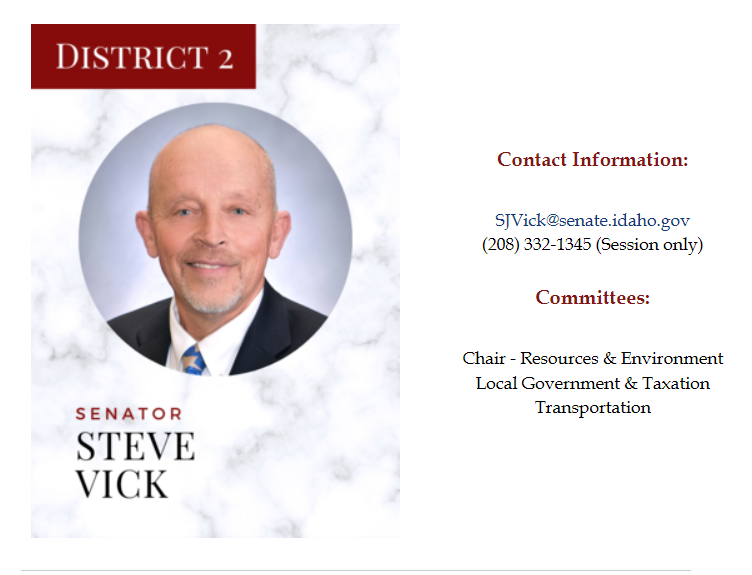
Dear Friends,
Below are some recent activities and highlights taking place in the Idaho Capitol. I hope you find this informative. For more details, you can go to legislature.idaho.gov where you will find bills, committee recordings, and live stream videos of our House and Senate floor sessions. I appreciate your interest and involvement.
Best regards,
Steve

Education Remains a Top Priority for Idaho Senate
Education remains a top priority for legislators and this week’s committee meetings reflect that commitment to providing a good education for Idaho students.
On Monday, the Senate Education Committee sent Senate Bill 1280 to the full Senate with a do-pass recommendation. The bill, co-sponsored by Senators Blair (R-Lewiston) and Crabtree (R-Grangeville), would define dyslexia in Idaho code, and recognize the unique influence and challenges students with characteristics of dyslexia face in developing their reading and literacy skills. The bill would require that school districts and charter schools assess students in kindergarten through fifth grade for characteristics of dyslexia so plans for specific interventions can be identified and offered. On Wednesday, the Senate passed the bill unanimously and sent it to the House for its consideration.
In that same committee hearing, Senator Carl Crabtree (R-Grangeville) introduced several bills designed to facilitate all-day kindergarten programs in Idaho schools. Senate Bill 1315 would provide funding for full-day kindergarten and revise provisions regarding certain support units and funding distributions. Currently, Idaho schools receive funding to run half-day kindergarten. It is estimated that the cost would be between $42 million and $46 million annually if 80% of schools took advantage of the funding. Parents who want to send their child to a full day of kindergarten would no longer have to pay extra money in tuition, and others would still have the option to send their child part-time. The bill prohibits schools from funding full-day kindergarten with maintenance and operation levies. The bill was printed and referred to the Senate Education Committee for a full hearing.
Senator Steven Thayn (R-Emmett) introduced companion legislation that protects the rights of parents who elect to not send their children to kindergarten. Senate Bill 1317 creates an Education Savings Account (ESA) for parents of kindergarten-age students that do not want to send their child to kindergarten but do plan on sending their child to the first grade in public school. The fund would provide $2000 per student, shared between the parent and school district, to prepare students for first grade outside of a traditional kindergarten classroom. The bill was printed and referred to the Senate Education Committee for a full hearing.
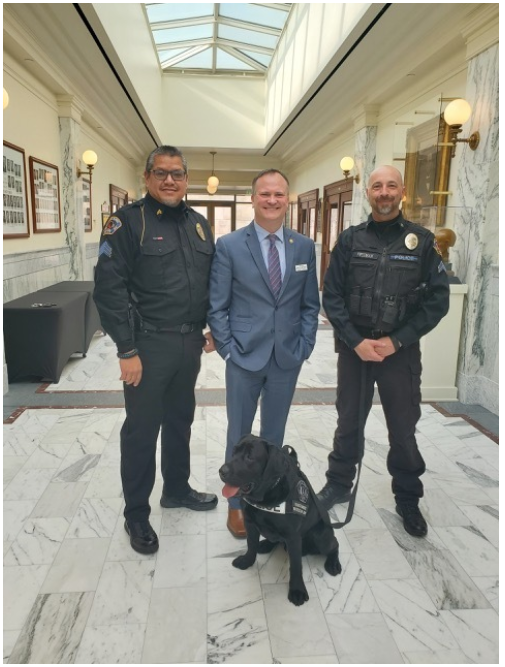 Pictured left to right: Travis Freeman, K9 Handler, Senator Anthon, and Det. Sgt. Samuel Kuoha of the Rupert City Police Department.
Pictured left to right: Travis Freeman, K9 Handler, Senator Anthon, and Det. Sgt. Samuel Kuoha of the Rupert City Police Department.
Newton, Idaho’s first Electronic Storage Detection K9 helps combat Child Exploitation
Newton, Idaho’s first Electronic Storage Detection K9, demonstrated his skills before the Senate Judiciary & Rules Committee. He is trained to sense and find electronic devices that store digital files. Newton is trained to detect triphenylphosphine oxide; it’s a chemical used in the manufacturing process for digital storage devices like cell phones, hard drives, USB sticks, and more.
Operation Underground Railroad assists local law enforcement with child exploitation prevention and provides 100% of the funds to train and make Newton available. Newton’s primary function is to assist in search warrant efforts to find digital evidence related to child exploitation and pornography, but Newton can be used in any crime investigation that has potential digital evidence. Watch a video of Newton in action here: https://youtu.be/rqe5W2nT8nk

Budget Presentations Continue, Attorney General Presents Need to Increase Salaries; Tobacco Use Prevention Budget Presented by Senator Patti Anne Lodge
During budget hearings on Monday morning, JFAC heard from the Office of the Attorney General concerning issues that pertain to rising turnover and lagging pay. Attorney General Lawrence Wasden is requesting a 10% office-wide pay increase to help curb the turnover by bringing levels up to match other public-sector attorney salaries in the state of Idaho. Wasden told JFAC that he recently lost five attorneys to the City of Boise and stated, “Their average salary increase was more than $20,000 … my office simply cannot compete in this environment without more resources … I am here today to make you aware of that problem.”
Wasden highlighted several of his office’s accomplishments while noting that this is the 19th consecutive year that his office has returned more money to the State than lawmakers appropriated to it. In the last year, his office filed three lawsuits against the Biden administration’s vaccine mandates for private employers, health care workers, and federal contractors.” Wasden stated, “along with Gov. Little, I consistently defend Idaho against federal overreach.”
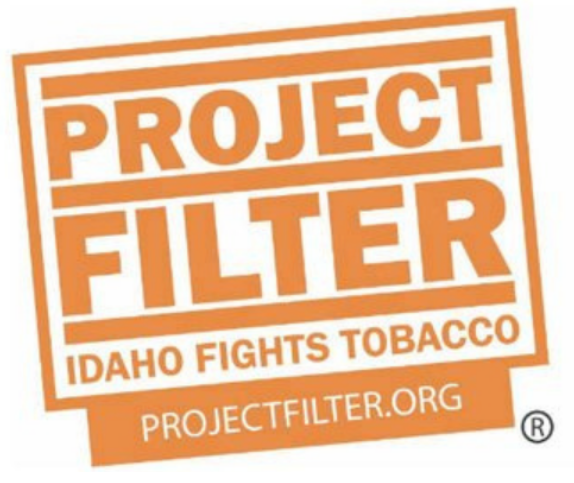
On Wednesday, Senator Patti Anne Lodge (R-Huston) presented budget recommendations from the Joint Millennium Fund Committee. The Fund was established as an endowment fund to receive, invest, and disburse funds that the State of Idaho receives as a result of the master settlement agreement reached with tobacco companies. This year’s recommendations include $2.7M for Project Filter, for tobacco compliance checks with the aim of reducing and preventing tobacco consumption; $14M to support Medicaid; $200K for the Attorney General’s office; funding $2M for public health districts. All programs and initiatives funded by the Millennium Fund are allocated with the express purpose to prevent and reduce tobacco consumption in Idaho. Overall, the Committee is seeking just over $22M to fund its anti-tobacco programming.

Mega Meta Data Center Comes to Kuna
Meta (the company formerly known as Facebook) is bringing a new 960,000-square-foot data center to Kuna, the first project of its kind for the company in Idaho. The project includes funding to develop local infrastructure, including building wastewater and sewer infrastructure. A number of factors led to the $800 million dollar investment, including a more competitive corporate tax rate, affordable energy rates, and incentives.
Idaho has long been viewed as an ideal location for data centers, with low risk of natural disasters, a stable climate, and a ready workforce. These factors, combined with the city’s access to infrastructure and renewable energy, and a great pool of talent, were all important factors in Meta’s decision.
The project will boost the local economy by bringing approximately 100 operational jobs to the City of Kuna, with more than 1,200 jobs at peak construction. Meta will break ground on the over 960,000 square-foot data center in September 2022, with construction anticipated to continue through 2025.
The Meta Kuna Data Center will be supported by 100% renewable energy from new resources connected to Idaho Power’s system. Meta will be the first customer to participate in Idaho Power’s proposed Clean Energy Your Way program. Meta’s commitment to sustainability is furthered by also investing in local water restoration projects to help restore the water the facility consumes.
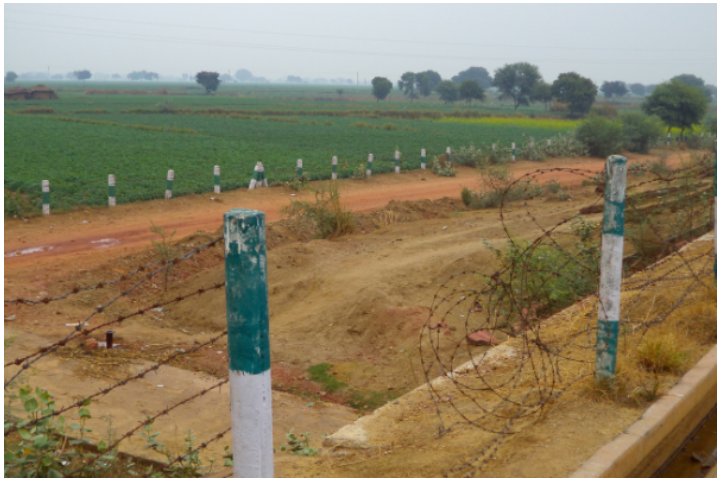
Senate Committee Considers Bill to Protect Idaho Cattle from Poorly Maintained Barbed Wire Fencing
On Monday, in the Senate Agricultural Affairs Committee, Senator Mark Harris (R-Soda Springs) introduced Senate Bill 1312, a bill that would protect open range, livestock and people from injury. It revises provisions and adjusts penalties. During his presentation, Senator Harris stressed the importance and sacredness of open range in Idaho, but our need to protect ranchers and public land users. The bill will be printed and heard in committee.

Water Management, Sustainability and Security in Idaho
Water plays a vital role in Idaho’s economy, power and energy, and politics. Plans to address changing weather and climate patterns, a growing population and historic patterns of overuse of Idaho’s water resources are under consideration by the Idaho Water Resources Board (IWRB). The IWRB is the governing agency for water management, rights and disputes in Idaho. It is considering an expansion of the Anderson Ranch Dam. After several years of work and negotiation, late last year the Idaho Water Resources Board approved a contract with the Bureau of Reclamation to design and construct a proposed 6-foot raise to Anderson Ranch Dam. The Dam, located northeast of Mountain Home, works in conjunction with Arrowrock and Lucky Peak Dams, to provide water for Idaho agriculture, commercial, municipal and industrial use. The expansion will capture an additional 29,000-acre feet of water. The project is projected to cost $83.3M to complete but will provide much-needed water to the Treasure Valley’s rapidly growing population.
IWRB is also working with Mountain Home Air Force Base to shift its water supply from groundwater. Instead, to support the $1B annual economic contribution of the Base, IWRB purchased senior water rights from the Simplot Corporation and is developing a water pipeline and water treatment facility to deliver water from the Snake River. This project not only provides a critical resource to a valued military partner, but does so in a manner that protects that resource and alleviates groundwater depletion.
Unfortunately, some water management and conservation efforts are beyond control. After a record-dry January, Idaho is experiencing widespread drought, with nearly half the state in drought conditions. This is not predicted to change in the coming months and statewide reservoir systems are unlikely to reach capacity this year.
Pro-life Legislation Clears Committee
On Wednesday, the Senate State Affairs Committee considered Senate Bill 1309, legislation modeled after a Texas law, aimed at protecting the unborn by halting all abortion in Idaho after detection of a fetal heartbeat. The bill would allow the father, aunt, uncle, grandparent or sibling of a fetus aborted after that point to file a civil lawsuit against the doctor for up to four years after the abortion and receive $20,000 minimum damages plus attorney fees. It has no other enforcement mechanism. The bill will be considered by the full Senate.
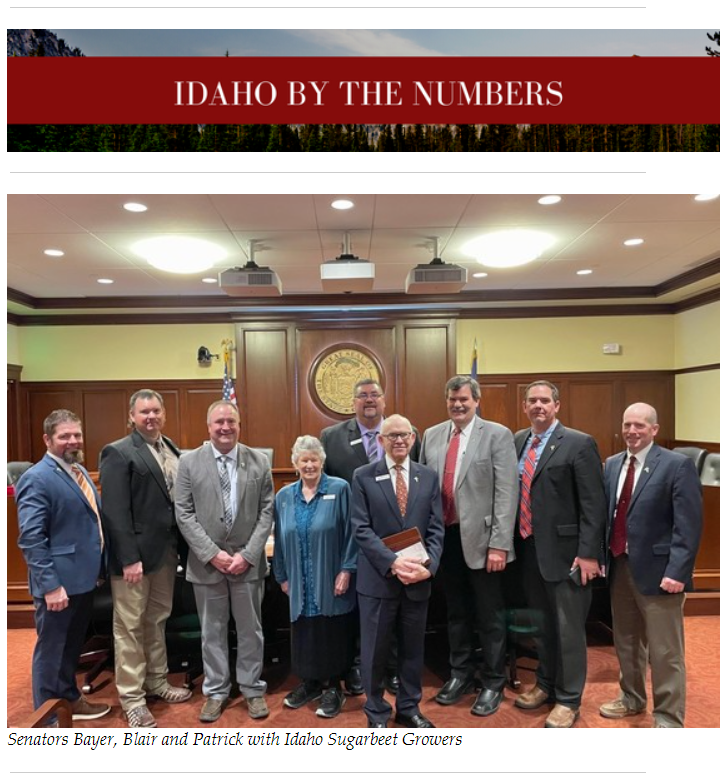
On Tuesday, Brad Griff, Executive Director, Snake River Sugarbeet Growers Association presented in front of the Senate Agriculture Affairs committee. Griff provided the committee with a “sugarbeet 101,” explaining how sugarbeets are grown and harvested, that each sugarbeet produces one cup of sugar and that sugarbeet production accounts for 55% of US sugar. He also outlined the substantial economic contribution of sugarbeet production in Idaho.
Idaho is the second largest sugarbeet producer in America, producing 19% of all sugar. With over 180,000 acres and eighteen counties of production, over 7M tons of sugarbeets are grown in Idaho every year, yielding $1.2B in annual revenue from the crop and finished sugar.
The Amalgamated Sugar Company, founded in 1987, is a grower-owned cooperative representing 700 members. Jessica Anderson, Public Affairs Manager for Amalgamated presented to the committee and reported that the company employs 1800 workers at their Nampa facility, with $123M in payroll. The company is the second-largest beet sugar company and produces 10% of real sugar in America. The company is looking to expand its operations and plans to invest $300M over the next 5 years. Through innovation and increased efficiencies, sugarbeet growers are producing 63% more sugar per acre than they were 25 years ago and are using 60% less diesel fuel. The company donated more than 28 tons of sugar to charitable causes in 2021.

S1312 This proposed legislation would amend existing law to revise provisions regarding the careless exposure of barbed wire and to revise penalties.
S1319 This bill amends contracts regarding school transportation services.
S1280 This bill would define dyslexia in Idaho code, and recognize the unique influence and challenges students with characteristics of dyslexia face in developing their reading and literacy skills. The bill would require that school districts and charter schools assess students in kindergarten through fifth grade for characteristics of dyslexia so plans for specific interventions can be identified and offered. Sent to the full Senate with a do-pass recommendation.
S1254 Amends, repeals, and adds to existing law to remove certain provisions regarding air quality related to motor vehicles and to provide revised provisions regarding air quality programs. Referred to 14th order for amendment.
H461 Amends existing law to revise eligibility requirements for the Armed Forces and Public Safety Officer Scholarship. Reported out of committee with a do pass recommendation.
S1291 Amends existing law to provide alternative methods of obtaining certain certifications.
S1228 Repeals existing law relating to enclosures of reservoirs and dumps.
HCR 29 States findings of the Legislature and encourages certain officers, agencies, and employees of the State to become informed about the impacts of traumatic childhood experiences and to implement interventions and practices to develop resilience in children and adults who have suffered from traumatic childhood experiences.
S1287 Adds to existing law to establish the rural nursing loan repayment program.
H 444 Amends 2021 session law to extend a sunset date to July 1, 2023. Filed for a second reading with Do Pass recommendation.
H 461 This bill aims to update Idaho code 33-4302 so that the child or spouse of a military member who has fallen in combat is eligible for this scholarship, seeing that they meet other prerequisites laid out in the bill. The bill has been referred to the Education Committee.
H 506 This bill would amend Section 33-4302(7) of Idaho Code to allow the Idaho Division of Veterans Services to determine disability for members of the Armed Forces, instead of the United States Social Security Administration.
HB 436 Income tax rebate; reduces independent and corporate income tax rate. House passed 57-13; Passed Senate 27-7-1. Signed by the Governor.
HB 441 This bill offers absentee ballot assistance for those in nursing care facilities by designating three authorized sources of voter assistance. Referred to House State Affairs.
HB 443: This proposed legislation will create a dedicated fund to bring school district employees’ healthcare coverage up to the same standard as that of state employees. The bill passed the House 55-14, passed the Senate 32-3 and has been signed by the Governor.
HB 450 This proposed legislation will provide employers with unemployment insurance tax rate stability and consistency by extending the 2021 unemployment insurance base tax rate over a period of two years. This will result in a tax savings of $64 million for Idaho businesses over the next two years. House passed 69-0. Referred to Senate Commerce & Human Resources and filed for a third reading.
SB 1226 This legislation declares that Idaho students can be designated as self-directed learners if they meet the criteria laid out in the bill. Introduced, printed and referred to Senate Education.
SB 1239 This bill would require the legislative session to end on or before the last Friday in March each year unless two-thirds of each house votes to go longer. A similar bill was introduced last year, but died in the house. Introduced, printed and referred to Senate State Affairs.
SB 1241 This bill makes a change to Idaho Code by increasing the maximum value of a home that qualifies for the property tax reduction program (aka Circuit Breaker) to assist more low-income applicants to remain in their homes. Reported out of Senate Local Government & Taxation with a do-pass recommendation. On Senate Second Reading Calendar.
SB 1242 This bill creates The Empowering Parents Grant Program which will provide funding to parents to help meet their child’s educational needs and to address any learning loss with grants of $1,000 per student or a maximum of $3,000 per family for public and non-public students. Introduced and referred for printing. Introduced, printed and referred to Senate Education.
SB 1249 This bill corrects an error in last year’s H 389 so that expiring Urban Renewal Districts come into local property tax budgets at eighty percent not subject to the eight percent cap. It also closes an unintended loophole regarding the use of foregone balances in property tax budgets. Reported out of Senate Local Government & Taxation with a do-pass recommendation. On Senate Second reading Calendar.
SB 1255 This bill creates The Empowering Parents Grant Program which will provide funding to parents to help meet their child’s educational needs and to address any learning loss with grants of $1,000 per student or a maximum of $3,000 per family for public and non-public students. Passed the Senate 34-1 and sent to the House.
SB 1262 This legislation enhances the protections for firearms, ammunition, and components during a declared disaster emergency. It establishes that those involved in firearm-related commerce and business are essential businesses and services. It provides that the procedures for concealed weapon licenses under Title 18, Chapter 33 cannot be circumvented and that firearms used in otherwise lawful conduct may not be seized pursuant to a disaster emergency declaration. Passed by the Senate and sent to the House for consideration.
S 1274 This legislation would prompt the Secretary of State to order a post-election audit after a general or primary election. This would give the public greater confidence in election results. This would likely cost less than $50,000 unless further auditing was needed based on initial results. Filed for a third reading.
State Capitol | P.O. Box 83720 | Boise, Idaho 83720-0081 | (208) 332-1334